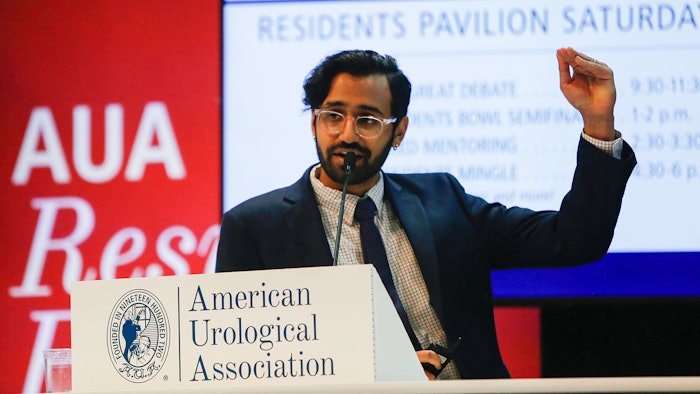The Great Debate: Expanded coverage
Kiran Sury, MD, named Grand Debate Champion.

The Great Debate, a series of short debates between residents from each AUA Section, has become a well-attended tradition at AUA. A standing room-only crowd watched, listened and cheered as residents tackled unresolved issues that vex urologists every day.
Is urethral bulking better than a midurethral sling for a healthy young woman with mild stress incontinence and minimal pelvic organ prolapse?
Absolutely, said Daniel A. Igel, MD, University of Kansas, representing the South Central Section. The multiple bulking agents available today work, with 77.1% of women in one survey calling themselves cured or improved. Midurethral slings have slightly higher outcomes, he noted, but come with a 30% rate of major complications and significant reoperation rates.
Legal settlements for mesh slings are approaching $8 billion.
“These are real, life-changing complications that happen,” Dr. Igel said.
Not so fast, responded Gaurav Pahouja, MD, Loyola University Medical Center, representing the North Central Section. There are many safer alternatives to mesh slings. There are no head-to-head comparisons of bulking agents, and AUA Guidelines recommend counseling patients for repeat injections.
“So, we’re supposed to flip a coin to choose a bulking agent?” he asked. “Remember, the long-term cure rate for bulking agents is 36%. That’s worse than the odds of winning at blackjack in a casino, (which are) 44%. We should offer our patients the best option: a midurethral sling.”
It was a close call, judges said, with Dr. Igel edging out Dr. Pahouja by less than a point.
Should medical students take a situational judgement test (e.g., CASPer) as part of the urology application process? This was the topic for this year’s Ethics debate, featuring Kian Asanad, MD (University of Southern California), representing the Western Section and Karen Doersch, MD, PhD (University of Rochester Medical Center), representing the Northeastern Section.
Situational judgement testing is one of the best alternatives residency programs have to assess candidates, said Dr. Asanad. Step one of the United States Medical Licensing Examination® and most clerkship exams are pass/fail and most interviews are virtual. A CASPer-like test may be the only way programs can assess candidates’ ethical values and approaches.
“Situational judgement tests are validated and very effective for programs,” Dr. Asanad argued. “Using these tests has been shown to increase diversity in residency programs.”
Validated, yes, but only valid for one cycle, said Dr.DoerschPlus, they are expensive. A single test fee is good for only eight programs.
“Who applies to just eight programs?” she asked. “Most students apply to 30 or more, which costs more than $415. Do you really want to place additional financial burdens on students who already carry an average of $241,600 in debt? Financial stress is associated with unprofessional, unethical behavior.”
Ultimately, the judges named Dr. Asanad the winner of the Ethics debate.
A total of eight debates, each in a particular subspecialty or topical area within urology, were featured. Other residents competing in this year’s Debate were: Syed Muneeb Alam, MD (South Central), Nikhil Batra, MD (Southeastern), Alexander Birk, MD (Mid-Atlantic), Annie Chen, MD (New York), Ankur Choksi, MD (New England), Jason Huang, MD (North Central), Steven Monda, MD (Western), Mike Pignanelli, MD (Northeastern), Shirin Razdan, MD (New York), Kiran Sury, MD (Mid-Atlantic), Eric Walton, MD (Southeastern) and Joanna Wang, MD (New England).
The Grand Debate Champion award went to Kiran Sury, MD, chief resident at the University of Pennsylvania, who achieved the highest overall score of all participants. Dr. Sury competed in the Urology Oncology round, representing the Mid-Atlantic Section.